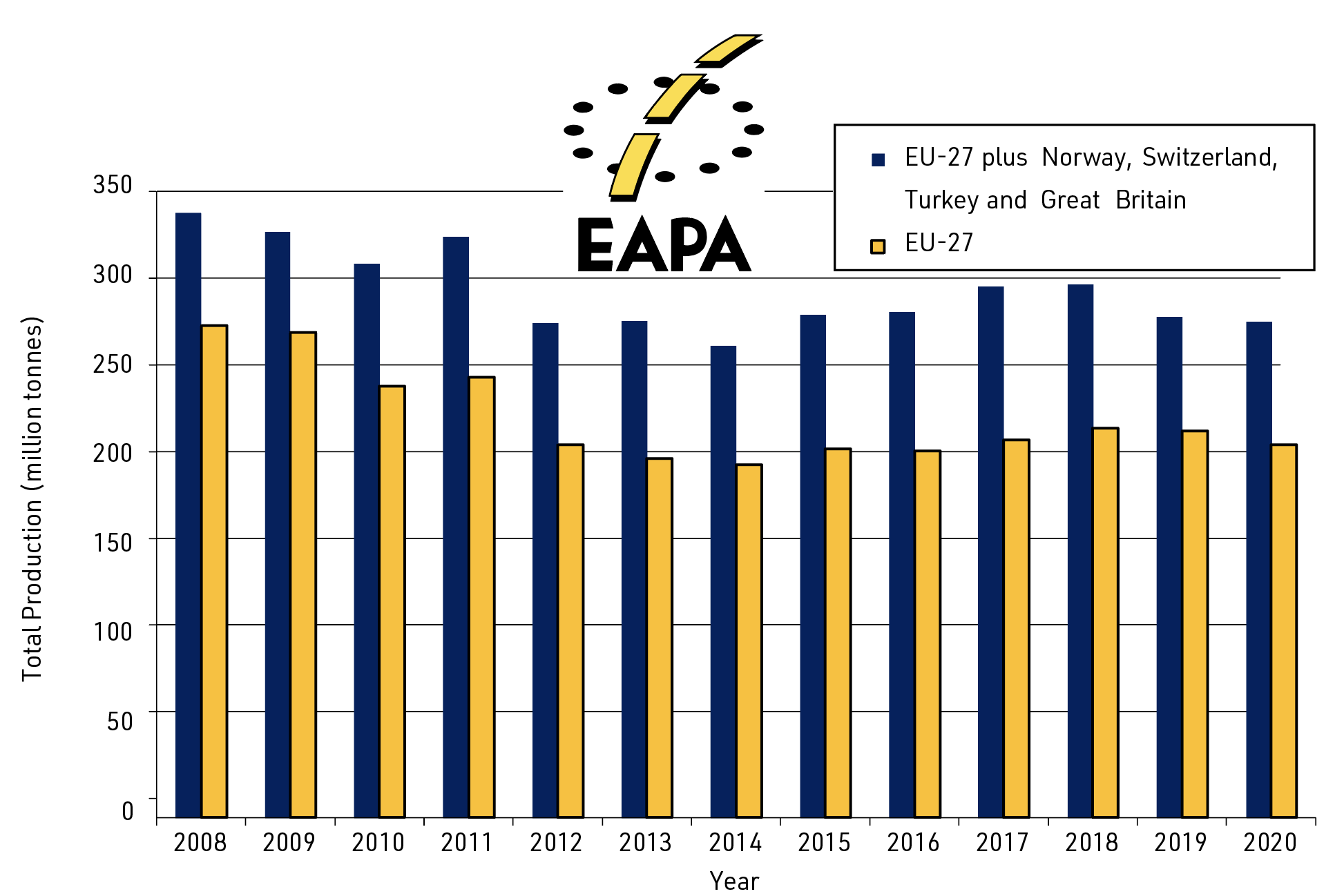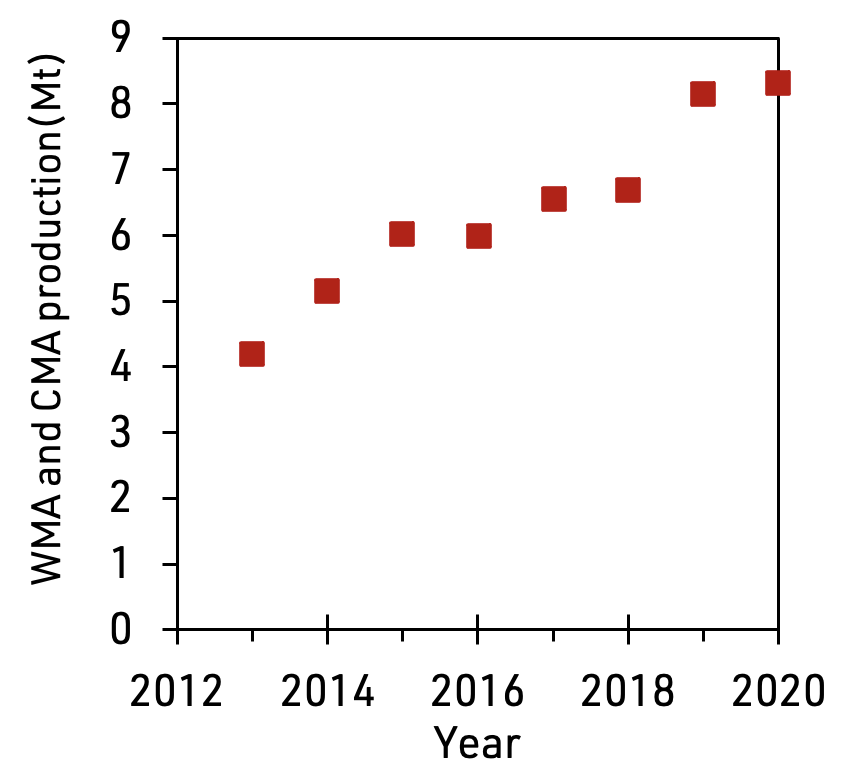Press Release – Asphalt in Figures 2020

Press Release
“EAPA Asphalt in Figures 2020 – Slight reductions in total production after the first year of the pandemic .”
Brussels, 20 December 2021. The European Asphalt Pavement Association (EAPA) has released its overview of the latest available production figures of the European Asphalt Industry, the “EAPA Asphalt in Figures 2020”.

Figure 1: Total Production of Asphalt in Europe from 2008 to 2020
In 2020 the total production of hot and warm mix asphalt (see Figure 1) decreased by 3,7% to 208,3 million tonnes for EU-27. However, when other European countries are included e.g. Great Britain, Norway, Switzerland and Turkey, the total production is reduced by only 1,0% (to 276,9 Mt). These reductions are most likely driven by the Covid-19 crisis but, as some projects were still ongoing in 2020, the figures of 2021 will be key to assess the actual impact of the pandemic in the sector.
In 2020, the main asphalt producer was Germany with 38,0 Mt, followed by France (31,9 Mt) and Turkey (31,7 Mt). The case of Turkey is especially relevant, as after the big drop in 2019, from 41,7 Mt to 23,5 Mt (-43,6%), in 2020 the production recovered a very significant 34,9%.
Figure 2-left shows the distribution of the reclaimed asphalt available in the following seventeen European countries providing data: Austria, Belgium, Croatia, Czech Republic, Denmark, Finland, France, Germany, Great Britain, Hungary, Ireland, Norway, Romania, Slovakia, Slovenia, Spain and Turkey. The total amount available in these countries was 46,4 Mt. The leading countries were Germany (11,6 Mt, 25% of total), France (6,0 Mt, 13%) and Great Britain (5,0 Mt, 11%). Data from Italy was not provided this year, but it was estimated as the value provided in 2019: 9,5 Mt (20%).
Figure 2-right shows the percentage of available reclaimed asphalt, which was re-used for the manufacture of new mixes (including HMA, WMA, Half-WMA and CMA), recycled as unbound road layers and other civil Engineering applications, and utilized in other unknown applications or put to landfill. For the calculation of these values, only countries providing full data (total amount and use percentages) were considered. These fourteen European countries were Czech Republic, Denmark, Finland, France, Germany, Great Britain, Hungary, Ireland, Norway, Romania, Slovakia, Slovenia, Spain and Turkey. In these countries, a total of 27,4 Mt of reclaimed asphalt were available, out of which, 64% were re-used, 33% were recycled and only 3% were used on unknown applications or put to landfill.

Figure 2. Total amount of reclaimed asphalt available in seventeen European countries providing data in 2020 (left) and the application of reclaimed asphalt in fourteen European countries providing data (right)
These figures make asphalt an important tool, within the construction sector, to meet the challenging objectives of circular economy, which the European Commission included in “The European Green Deal”.
The production of Warm Mix Asphalt (WMA), an important tool to reduce the emissions and energy consumption of the sector, has been generally increasing over the last years (Figure 3), reaching new hights in 2020 with a production of 8,3 Mt. European champion in WMA production was France with 4,1 Mt, followed by Norway (1,9 Mt). It is especially remarkable the huge increase in Norway, where the WMA production in 2020 was almost four times the value of 2016.

Figure 3. Total production of Warm Mix Asphalt in European countries providing data
About Reduced-Temperature and Warm Mix Asphalts
A reduced-temperature asphalt is a normal asphalt that is produced and applied at a temperature lower than an equivalent “Hot Mix Asphalt” (HMA). When such temperature reduction is around 20-40°C, the material is called Warm Mix Asphalt (WMA). Thanks to the lower production and application temperature, this WMA has several advantages, e.g.
- Environmental benefits: less energy used and lower emissions.
- Paving operations benefits: WMA can be compacted at a lower temperature than HMA. Thus, WMA will cool faster to ambient temperatures and therefore, the site can be opened for traffic at an earlier stage.
- Asphalt workers benefit: improved working conditions with less emissions.
More information can be found on following websites:
About “Asphalt in Figures”
Every year EAPA is collecting and publishing the latest available key figures of the European asphalt industry in the so called “Asphalt in Figures”. In these overviews you can find data of the asphalt production in Europe, data regarding the application and the use of binders. The data has been collected and provided since 1990 with e.g. the assistance of the members of the European Asphalt Pavement Association (EAPA). The releases since 2013 are publicly available on the EAPA website. For more information, please contact us.
Notes for Editors
EAPA is the voice of the Asphalt Paving Industry in Europe. With more than 40 Members and Associated Members, EAPA represents most of the asphalt pavement industry engaged in asphalt production, asphalt road construction and maintenance all over Europe. EAPA works to ensure that the use of asphalt, as the optimum choice for the construction and maintenance of the vital European road infrastructure, is fully appreciated, promoted, and implemented. Conscious of the importance of providing information to the public, EAPA is pleased to present to you the data of ‘Asphalt in Figures’ for the year 2020.
Contact
Dr. Breixo Gómez, EAPA Technical Director, email: breixo@eapa.org,
Twitter: @B_GomezMeijide and @eapa_org, LinkedIn: @breixogomezmeijide, phone: +32 (0)497179754
EAPA Wesbite: www.eapa.org
